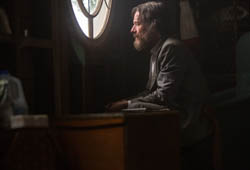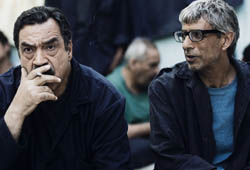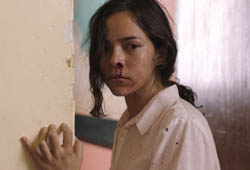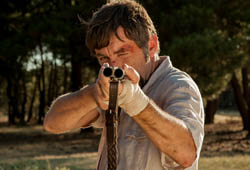Toronto International Film Festival 2016 - UPDATE #5
Wakefield
Directed by Robin Swicord
USA/106 MINUTES/SPECIAL PRESENTATIONS
 Based on a short story by E.L. Doctorow, Wakefield follows Bryan Cranston's Howard Wakefield as he decides to abandon his life by surreptitiously moving into the attic above his garage - with the film detailing his growing distance from his former life and the impact the move has on his wife (Jennifer Garner's Diana). It's an oddball premise that's employed to reasonably compelling effect by Robin Swicord, and it's worth noting that Howard's decision makes more sense here than it did in Doctorow's original tale - as writer/director Swicord goes to great pains to explain away the rationale for Howard's inexplicable move. (As Howard himself notes at one point, "who hasn't had the impulse to put their life on hold just for a second.") The silliness of the setup is, as a result, generally allayed by Swicord's impressively steady directorial hand and by Cranston's thoroughly ingratiating turn as the central character, with, in terms of the latter, Wakefield certainly getting plenty of mileage out of Howard's frequent imaginary conversations between the house's occupants. (The movie unfolds entirely from Howard's perspective, while flashbacks are sporadically employed to flesh out certain aspects of the story.) It's all quite watchable, to be sure, but it's equally apparent that there's simply not enough material here to comfortably sustain a 104 minute motion picture - with the film, particularly in its second half, suffering from a number of lulls that prove impossible to ignore (eg Howard's periodic excursions away from the house aren't, generally speaking, terribly interesting). The ambiguous, only partially satisfying conclusion ultimately confirms Wakefield's place as a subdued curiosity of a film, with Swicord's climactic efforts at tugging at one's heartstrings falling rather flat.
Based on a short story by E.L. Doctorow, Wakefield follows Bryan Cranston's Howard Wakefield as he decides to abandon his life by surreptitiously moving into the attic above his garage - with the film detailing his growing distance from his former life and the impact the move has on his wife (Jennifer Garner's Diana). It's an oddball premise that's employed to reasonably compelling effect by Robin Swicord, and it's worth noting that Howard's decision makes more sense here than it did in Doctorow's original tale - as writer/director Swicord goes to great pains to explain away the rationale for Howard's inexplicable move. (As Howard himself notes at one point, "who hasn't had the impulse to put their life on hold just for a second.") The silliness of the setup is, as a result, generally allayed by Swicord's impressively steady directorial hand and by Cranston's thoroughly ingratiating turn as the central character, with, in terms of the latter, Wakefield certainly getting plenty of mileage out of Howard's frequent imaginary conversations between the house's occupants. (The movie unfolds entirely from Howard's perspective, while flashbacks are sporadically employed to flesh out certain aspects of the story.) It's all quite watchable, to be sure, but it's equally apparent that there's simply not enough material here to comfortably sustain a 104 minute motion picture - with the film, particularly in its second half, suffering from a number of lulls that prove impossible to ignore (eg Howard's periodic excursions away from the house aren't, generally speaking, terribly interesting). The ambiguous, only partially satisfying conclusion ultimately confirms Wakefield's place as a subdued curiosity of a film, with Swicord's climactic efforts at tugging at one's heartstrings falling rather flat.


 out of
out of 



Blessed Benefit
Directed by
Mahmoud al Massad
JORDAN/GERMANY/NETHERLANDS/83 MINUTES/DISCOVERY
 Blessed Benefit follows affable contractor (and Jeff Goldblum lookalike) Ahmad (Ahmad Thaher) as he's sent to prison for three months on a relatively minor fraud charge - with the movie mostly detailing Ahmad's efforts at acclimatizing himself to life behind bars. There's ultimately very little within Blessed Benefit one hasn't seen many, many times in other, better prison films, as filmmaker Mahmoud al Massad leans heavily on the genre's various conventions and cliches (eg the weary lifer who can get you anything you need) - with the movie's deliberate, subdued narrative focused primarily on the minutia of Ahmad's day-to-day exploits within the ramshackle facility (eg Ahmad finds it too bright to sleep, Ahmad must contend with a lack of phone availability, etc, etc). It's all quite well done and the performances are uniformly solid, and yet there's just never a point at which one is wholeheartedly drawn into the picture - with the oh-so-slight atmosphere perpetuated by an ongoing emphasis on relatively pointless subplots. (The continuing efforts of Ahmad's cousin to come up with bail money stands as a fairly apt example of this, despite the fact that the movie's best scene, involving an inept attempt to sell laptops, emerges from this portion of the proceedings.) By the time the abrupt and somewhat meaningless conclusion rolls around, Blessed Benefit has confirmed its place as an almost passable endeavor that's just too forgettable to make much of an impact.
Blessed Benefit follows affable contractor (and Jeff Goldblum lookalike) Ahmad (Ahmad Thaher) as he's sent to prison for three months on a relatively minor fraud charge - with the movie mostly detailing Ahmad's efforts at acclimatizing himself to life behind bars. There's ultimately very little within Blessed Benefit one hasn't seen many, many times in other, better prison films, as filmmaker Mahmoud al Massad leans heavily on the genre's various conventions and cliches (eg the weary lifer who can get you anything you need) - with the movie's deliberate, subdued narrative focused primarily on the minutia of Ahmad's day-to-day exploits within the ramshackle facility (eg Ahmad finds it too bright to sleep, Ahmad must contend with a lack of phone availability, etc, etc). It's all quite well done and the performances are uniformly solid, and yet there's just never a point at which one is wholeheartedly drawn into the picture - with the oh-so-slight atmosphere perpetuated by an ongoing emphasis on relatively pointless subplots. (The continuing efforts of Ahmad's cousin to come up with bail money stands as a fairly apt example of this, despite the fact that the movie's best scene, involving an inept attempt to sell laptops, emerges from this portion of the proceedings.) By the time the abrupt and somewhat meaningless conclusion rolls around, Blessed Benefit has confirmed its place as an almost passable endeavor that's just too forgettable to make much of an impact.

 out of
out of 



The Untamed
Directed by
Amat Escalante
MEXICO/DENMARK/FRANCEGERMANY/NORWAY/SWITZERLAND/100 MINUTES/VANGUARD
 Certainly one of the weirdest movies at this year's festival, The Untamed primarily details the domestic exploits of a Spanish married couple and the impact his infidelity (with her brother, no less) has on their lives - with the movie also focused on a mysterious cabin in the woods and the otherworldly entity residing within. Filmmaker Amat Escalante's ambitious sensibilities ensure that The Untamed fares best in its moody, ominous opening half hour, with the film's opening shot of an asteroid seemingly setting the stage for a creepy sci-fi effort. It's disappointing to note, then, that the movie almost immediately segues into a slow-moving narrative that's rife with uninvolving elements, as Escalante stresses the relationships between the aforementioned characters (despite the fact that it never quite becomes entirely clear how some of them are connected). And although the viewer is willing to give Escalante a great deal of leeway in light of the promising opening stretch and recurring emphasis on creepy elements, The Untamed's oblique nature eventually, inevitably ceases being interesting and instead just becomes frustrating (with this vibe undoubtedly compounded by the astonishingly deliberate pace). It's clear, too, that Gibrán Portela and Escalante's vague screenplay makes it impossible to entirely decipher the behavior of certain figures (eg why does a character have a one-night stand with a local hunter?) The comically abrupt ending leaves many of the story's biggest questions unanswered, and it's ultimately impossible to label The Untamed as anything more than a smug art-house exercise in frustration (ie where's the payoff for all this, exactly?)
Certainly one of the weirdest movies at this year's festival, The Untamed primarily details the domestic exploits of a Spanish married couple and the impact his infidelity (with her brother, no less) has on their lives - with the movie also focused on a mysterious cabin in the woods and the otherworldly entity residing within. Filmmaker Amat Escalante's ambitious sensibilities ensure that The Untamed fares best in its moody, ominous opening half hour, with the film's opening shot of an asteroid seemingly setting the stage for a creepy sci-fi effort. It's disappointing to note, then, that the movie almost immediately segues into a slow-moving narrative that's rife with uninvolving elements, as Escalante stresses the relationships between the aforementioned characters (despite the fact that it never quite becomes entirely clear how some of them are connected). And although the viewer is willing to give Escalante a great deal of leeway in light of the promising opening stretch and recurring emphasis on creepy elements, The Untamed's oblique nature eventually, inevitably ceases being interesting and instead just becomes frustrating (with this vibe undoubtedly compounded by the astonishingly deliberate pace). It's clear, too, that Gibrán Portela and Escalante's vague screenplay makes it impossible to entirely decipher the behavior of certain figures (eg why does a character have a one-night stand with a local hunter?) The comically abrupt ending leaves many of the story's biggest questions unanswered, and it's ultimately impossible to label The Untamed as anything more than a smug art-house exercise in frustration (ie where's the payoff for all this, exactly?)

 out of
out of 



The Fury of a Patient Man
Directed by
Raúl Arévalo
SPAIN/92 MINUTES/DISCOVERY
 Raúl Arévalo's directorial debut, The Fury of a Patient Man details the tension that ensues after a man (Luis Callejo's Curro) is released from prison after an eight-year stint for armed robbery - with Curro's wife, Ruth Díaz's Ana, having engaged in an affair with José (Antonio de la Torre) during that almost decade-long period. It's a fairly hackneyed premise that is, at the outset, employed to underwhelming and uninvolving effect by Arévalo, as the first-time filmmaker, who kicks the proceedings off with an impressively riveting sequence, delivers a first half that progresses at a snail's pace and is almost entirely lacking in interesting, attention-holding elements. (The familiarity of the tedious love-triangle narrative doesn't help matters, surely.) Just as one is ready to write the film off as a well-intentioned misfire, however, Arévalo offers up a mid-movie twist that essentially changes everything and paves the way for a second half rife with electrifying sequences. (There is, for example, an impressively tense interlude set in the basement of an boxing club.) It does, as such, become relatively easy to overlook the pacing issues that continue to plague the proceedings, with the movie's wonky sense of momentum ultimately unable to dull the impact of the engrossing finale (which contains a palpable grittiness that's reminiscent of Sam Peckinpah's work). The end result is an almost terminally uneven endeavor that nonetheless, to an increasingly obvious extent, justifies its existence, with the strength of the movie's second half compensating for the comparatively disastrous opening half hour.
Raúl Arévalo's directorial debut, The Fury of a Patient Man details the tension that ensues after a man (Luis Callejo's Curro) is released from prison after an eight-year stint for armed robbery - with Curro's wife, Ruth Díaz's Ana, having engaged in an affair with José (Antonio de la Torre) during that almost decade-long period. It's a fairly hackneyed premise that is, at the outset, employed to underwhelming and uninvolving effect by Arévalo, as the first-time filmmaker, who kicks the proceedings off with an impressively riveting sequence, delivers a first half that progresses at a snail's pace and is almost entirely lacking in interesting, attention-holding elements. (The familiarity of the tedious love-triangle narrative doesn't help matters, surely.) Just as one is ready to write the film off as a well-intentioned misfire, however, Arévalo offers up a mid-movie twist that essentially changes everything and paves the way for a second half rife with electrifying sequences. (There is, for example, an impressively tense interlude set in the basement of an boxing club.) It does, as such, become relatively easy to overlook the pacing issues that continue to plague the proceedings, with the movie's wonky sense of momentum ultimately unable to dull the impact of the engrossing finale (which contains a palpable grittiness that's reminiscent of Sam Peckinpah's work). The end result is an almost terminally uneven endeavor that nonetheless, to an increasingly obvious extent, justifies its existence, with the strength of the movie's second half compensating for the comparatively disastrous opening half hour.


 out of
out of 



Colossal
Directed by
Nacho Vigalondo
CANADA/110 MINUTES/VANGUARD
 Impossible to classify (and gleefully so), Colossal follows Anne Hathaway's Gloria as she returns to her hometown in an effort at sorting out her life - with the movie also, sporadically, detailing a series of monster attacks occurring at exactly 8:05 every morning in Korea. (The two storylines do converge, eventually.) Filmmaker Nacho Vigalondo does a nice job of initially establishing the somewhat low-key Hathaway storyline, with the effectiveness of this stretch heightened by Hathaway's solid performance and an extremely affable supporting cast that includes Jason Sudeikis and Tim Blake Nelson. It's clear, however, that Colossal, saddled with a needlessly overlong running time, suffers from a number of lulls and dull spots, with Vigalondo's meandering modus operandi paving the way for a midsection that's often as captivating as it is tedious. This is despite the absolutely ingenious manner by which Vigalondo connects the two seemingly incongruous storylines, and it's clear, certainly, that Colossal is at its best during the characters' initial discovery of their palpable connection to the aforementioned attacks. It's obvious, too, that the movie benefits substantially from a certain character's unexpected transformation from protagonist to antagonist, with the subsequent dynamic between that figure and others, which is certainly quite electrifying, paving the way for an engaging and surprising third act. It is, in the end, clear that Colossal is a good movie that could've been great, with the padded-out 110-minute running time unquestionably ranking high on the films list of lamentable deficiencies.
Impossible to classify (and gleefully so), Colossal follows Anne Hathaway's Gloria as she returns to her hometown in an effort at sorting out her life - with the movie also, sporadically, detailing a series of monster attacks occurring at exactly 8:05 every morning in Korea. (The two storylines do converge, eventually.) Filmmaker Nacho Vigalondo does a nice job of initially establishing the somewhat low-key Hathaway storyline, with the effectiveness of this stretch heightened by Hathaway's solid performance and an extremely affable supporting cast that includes Jason Sudeikis and Tim Blake Nelson. It's clear, however, that Colossal, saddled with a needlessly overlong running time, suffers from a number of lulls and dull spots, with Vigalondo's meandering modus operandi paving the way for a midsection that's often as captivating as it is tedious. This is despite the absolutely ingenious manner by which Vigalondo connects the two seemingly incongruous storylines, and it's clear, certainly, that Colossal is at its best during the characters' initial discovery of their palpable connection to the aforementioned attacks. It's obvious, too, that the movie benefits substantially from a certain character's unexpected transformation from protagonist to antagonist, with the subsequent dynamic between that figure and others, which is certainly quite electrifying, paving the way for an engaging and surprising third act. It is, in the end, clear that Colossal is a good movie that could've been great, with the padded-out 110-minute running time unquestionably ranking high on the films list of lamentable deficiencies.